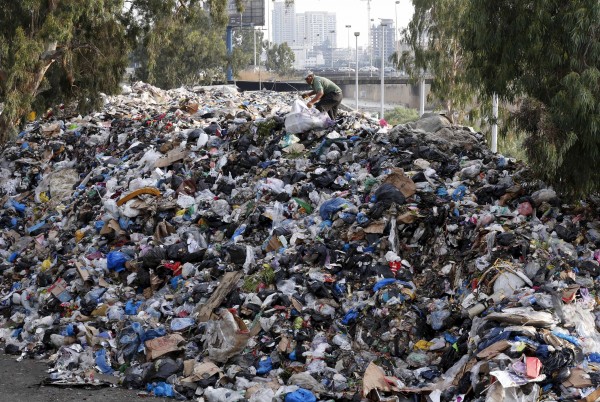
The cabinet announced Thursday that it will return to a waste management plan based on ” landfills” if the British firm which was awarded the export contract fails to submit the required documents by Friday.
“The prime minister explained the circumstances ,” Information Minister Ramzi Jreij told reporters after a cabinet session at the Grand Serail.
“After the firm unveiled the country of destination, indications have surfaced about this country’s refusal to receive the waste and the cabinet must discuss other alternatives should the export option fail,” he added.
“The conferees agreed that it will be inevitable to return to the landfill alternative solution should the firm fail to submit the required documents by tomorrow,” Jreij said, adding that the ministerial waste management panel will convene Saturday morning to take the appropriate decisions.
The garbage export scandal rocked the country in recent days following claims made by the Russian Environment Ministry that the Russian documents presented by the Lebanese embassy on the export contract were fake.
Agriculture Minister Akram Shehayyeb told As Safir newspaper in remarks published Thursday that Britain’s Chinook Urban Mining company, which has received the government’s approval to export the waste, has until Friday to provide the Lebanese authorities with a document that carries the signatures of the Russian Foreign and Environment Ministries and the Lebanese Embassy in Moscow.
The document should also include the signature of the Russian Environment Ministry on its commitment to the export of waste based on the Basel Convention on the Control of Transboundary Movements of Hazardous Wastes and Their Disposal, he said.
“If it (Chinook) was not able to provide the required documents, then the agreement which has been struck with it would be immediately considered void,” warned the minister.
Ambiguity emerged earlier this week on the deal struck with Chinook when Nikolai Gudkov, press officer at the Natural Resources and Environment Ministry, denied that Russia gave the green light to send Lebanon’s waste to a Russian province, describing a document received from the British firm by the authorities in Moscow as fake and forged.
Shehayyeb denied the claim that Chinook fabricated the permits it needs to export the waste.
He said Russian Foreign Minister Sergei Lavrov had informed Prime Minister Tammam Salam during discussions on the sidelines of a security conference in Munich last week that Moscow welcomes the cooperation with the Lebanese authorities on the export of trash.
“It seems something unnatural happened in Russia at the last minute,” he said.
Shehayyeb also warned that garbage will pile up on the streets again if the export plan fails.
Lebanon’s trash management crisis erupted in July 2015 when the country’s largest landfill in Naameh, which received the waste of Beirut and Mount Lebanon, was closed.
The garbage piled up on the streets and in random locations raising health and environmental concerns and sparking unprecedented street protests against the entire political class.
The cabinet later approved a waste export plan after the authorities failed to find alternatives.
Hezbollah parliamentary bloc issued a statement on Thursday calling for resorting to the landfill solution
“It is unfortunate that the trash crisis has taken such a turn and we call for resorting to the landfill solution.” The statement read .
Interior Minister Nouhad al-Mashnouq told MTV: “We are no longer waiting for Chinook’s answer and efforts are heading now to revive the landfill plans.”
National News Agency reported that “You Stink civil society activists will hold a press conference at 8:30 pm in Riad al-Solh square to comment on the trash exportation scandal.

Leave a Reply
You must be logged in to post a comment.